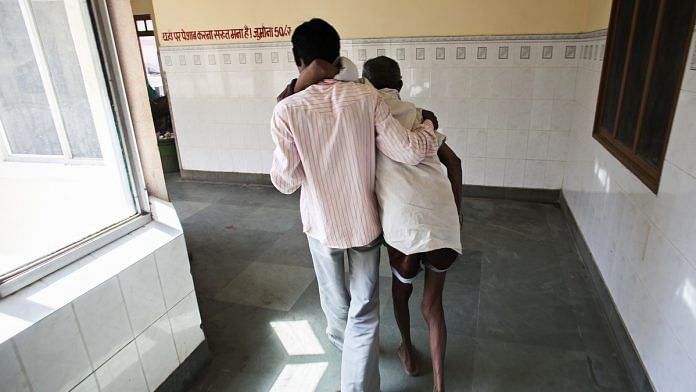New Delhi: The Modi government’s order slashing the price of nearly 400 cancer medicines appears to have had little effect on an important constituent of cancer treatment — patented drugs that are the costliest of the lot.
The National Pharmaceutical Pricing Authority (NPPA) on 8 March had released a list of 390 cancer medicines that it had brought under a price control regime by capping their trade margins at 30 per cent. This was expected to bring down the price of the medicines by up to 87 per cent.
The list included just a few of the patented drug but since the decision was taken, even their prices have reduced only marginally. Take for instance Xalkori, patented by Pfizer for lung cancer, and which was on the list.
The price, for 250 mg of these capsules, has fallen by a mere 0.4 per cent. As the revised prices were applicable immediately, the current price of the medicine is Rs 1,06,270 for 60 capsules against the earlier price of Rs 1,06,698 — a difference of just Rs 428.
Many of the popular patented cancer drugs — mentioned in a working series paper (pg 38) by former Indian Institute of Management (Calcutta) professor Sudhir Chaudhuri — have not made it on the list.
For instance, Axitinib, which is used to treat kidney cancer, hasn’t been brought under price control. A strip of 5 mg tablets cost Rs 41,737.
A 50 ml bottle of Cetuximab, used to treat head, colon, rectum and neck cancer costs Rs 94,544. It too isn’t on the list. Ixabepilone, which is used to treat advanced breast cancer, has also been left out. A 45 mg vial of this drug costs approximately Rs 71,886.
Also not on the list is Sprycel, which is used to treat blood cancer. Around 60 tablets, each of 50 mg, of Sprycel, cost Rs 1,97,238. (All prices as per online pharmacies).
And the government has no plans to address this.
“The prices of patented drugs cannot be curbed and should not be curbed,” Vinod K. Paul, member, NITI Aayog, told ThePrint. “In principle, it is a discovery and we should respect the innovation.”
He further clarified that the government, at this juncture, is not considering any proposal to reduce the prices of patented anti-cancer drugs.
Paul had headed the Niti Aayog expert committee on pharma pricing, which the government had formed in January, a move that was seen as an attempt to clip the wings of the drug watchdog, the NPPA.
The government’s decision on cancer drugs last week was based on the recommendations of this panel.
Also read: How Narendra Modi’s Ayushman Bharat is fighting India’s health emergency
Firms can use another rule to bypass price control order
The companies also can claim relaxation, from last week’s order, using another Modi government notification, experts say.
On 3 January, the Department of Pharmaceuticals had made gazetted amendments to the drug pricing control order (DPCO), 2013, to allow no price control on patented drugs for five years since the start of commercial marketing of the drug in India.
“Companies can use government’s own notification to claim relaxation and even the marginal dip in prices due to trade margin deductions would be taken off the MRP,” said Malini Aisola, co-convenor of All India Drug Action Network (AIDAN), which works in this sector.
Price curbs should not be imposed just for the heck of it: Paul
Paul said that the pruning of trade margins in cancer drugs will now be a regular process. “In the latest policy decision, we have strengthened our mechanisms to watch the excessive trade margins and it will now be a routine procedure to slash and curb the trade margins across the medicines,” Paul said.
He, however, warned that excessive price controls hurt the industry and by extension, patients
“Around 20 per cent of the costly drugs feature among the national list of essential medicines which is the basis of price control. The process of curbing the prices of drugs should be a rational process and must not be done just for the heck of it’,” he said, adding that “killing the growth of the pharmaceutical market is against the public interest”.
Also read: Modi govt’s Ayushman Bharat could be behind sharp spike in rural health inflation



